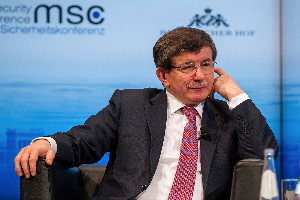The AKP’s 5th Congress showed that the Party Is Deeply Split
By M. K. Kaya
September 23rd, 2015, The Turkey Analyst
With the 5th party congress, the deep divisions within the AKP came to the surface. President Erdoğan masterminded the exclusion of the other “founding fathers” – Abdullah Gül and Bülent Arınç – from the leadership of the party. The party congress also effectively finished off Ahmet Davutoğlu as a serious leader. In fact, the AKP is at an impasse. The struggle that has been raging within the party is exclusively a struggle over power and control, not about the ideological direction, and the party cadres – whether they are behind Erdoğan or disgruntled with his leadership style – are by and large a spent force in Turkish politics.
Turkey Is Not Going to Be “Normalized” Under the AKP’s leadership
By Toni Alaranta (vol. 8, no. 14 of the Turkey Analyst)
There is widespread expectation that “normalization” and democratic consolidation will follow the June 7 election, which deprived the ruling Justice and Development Party (AKP) of its majority. The talk about “normalization” and President Recep Tayyip Erdoğan becoming “isolated” presupposes that Turkey’s democratic travails emanate exclusively from Erdoğan’s power hunger, and that once this factor is eliminated, the AKP will once again become the “normalizing force” it allegedly was previously. However, “normalization” would mean abandoning not only Erdoğan but the very political narrative disseminated by the AKP during its years in power, and thus the mission of the party.
The Case for a Coalition with the CHP: the AKP Needs to Refurbish Its Image in the West
By Halil Karaveli (vol. 8, no. 14 of the Turkey Analyst)
The AKP’s loss of its absolute majority in the June 7 parliamentary election may paradoxically offer the regime the chance to refurbish its tarnished image in the West. That, at least, is how some of the leading representatives of the regime judge the present situation. A coalition government with the center-left CHP is perceived as a chance for the AKP to rid itself of the charges of authoritarianism. Western endorsement has always been critically important for AKP, and the party is desperate to regain its lost legitimacy in the West. The question, though, is why the CHP would even contemplate lending itself to a project that would only entrench the AKP regime.

Looking Strong but Fragile: A New AKP and a “New Turkey”
By Halil Karaveli (vol. 7, no. 15 of the Turkey Analyst)
The appointment of Ahmet Davutoglu to head the ruling Justice and Development Party (AKP) represents a doubling down on the party’s Sunni Islamic ideology. But ideology alone will not be sufficient to keep the AKP in power. The self-confident ideological rhetoric that proclaims the advent of a “New Turkey” masks what is in fact a fragile economic reality. Such rhetoric is not indefinitely going to be a substitute for the kind of material progress absent which the prospects for the “New Turkey” and its power-holders look bleak.

Bluff and Bravado: Turkey's Long Presidential Campaign
By Gareth H. Jenkins (vol. 5, no. 19 of the Turkey Analyst)
On October 1, 2012, in an address to parliament, President Abdullah Gül criticized the government of Prime Minister Tayyip Erdoğan for its failure to push ahead with Turkey’s bid for EU membership and protested the continuing imprisonment of seven elected opposition members of the assembly. His speech came a day after Erdoğan had effectively launched his campaign to succeed Gül as president in August 2014. Speaking at the biannual congress of the ruling AKP, Erdoğan implicitly signaled his presidential ambitions by offering to serve the country in a capacity other than prime minister; while delegates were handed leaflets advocating the replacement of the country’s parliamentary system with a presidential one. No one was in any doubt as to who Erdoğan believed should head the new system. As a result, Gül’s speech to parliament was also a public gesture of defiance, a calculated demonstration of his unwillingness to meekly cede the presidency to Erdoğan.



